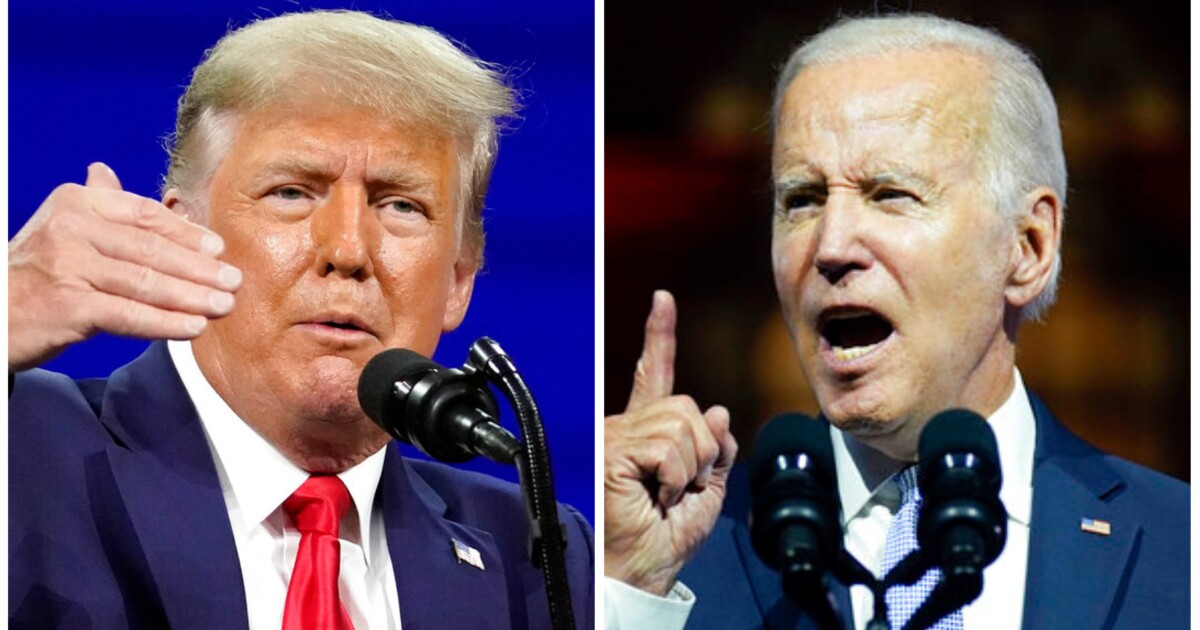

Based on polling data and historic trends, President Joe Biden could be one of the biggest beneficiaries of a third presidential run by Donald Trump.
Trump announced a rare third run as his party’s nominee and is likely to face Biden in a rematch should the incumbent also run again.
HOW CEDING THE SPOTLIGHT LED TO BIDEN DEFYING MIDTERM EXPECTATIONS
In the aftermath of Trump’s announcement, Biden declined to answer a reporter’s question about his predecessor’s former rival. But he did send a tweet saying Trump had failed America.
Biden was asked last week if he’d rather face Trump or Gov. Ron DeSantis (R-FL) in a hypothetical 2024 presidential contest, and responded, “It’d be fun watching them take on each other” in a primary. The president previously said he’d be “very fortunate” to be matched up against Trump again two years from now.
Biden has already beaten Trump once, and while polls show that two-thirds of Democrats don’t want Biden to run again, they’ve also found that 92% would vote for him again should he face the same opponent. Biden brought up this point himself in July, saying, “read the polls, Jack,” to a reporter who brought up 2024.
Polling also shows that DeSantis stacks up better against Biden than Trump does. Even so, if the GOP nominee is not Trump, that candidate could emerge bruised from the primary battle, or Trump could even launch a spoiler third-party campaign.
“The more prominent Trump is, the better it is for Biden,” said Democratic strategist Brad Bannon. “If you’re going to run against an incumbent for president, the best way to beat him is to find a candidate who is more popular than the incumbent, and clearly that is not the case with Trump.”
The Biden administration’s midterm strategy focused on turning attention away from the president and toward the threat of Trump-aligned “MAGA” Republicans, which paid off as the Democratic Party kept control of the Senate and is expected to lose less than 20 seats in the House.
According to a Morning Consult poll, just 33% of voters had Biden on their minds as they cast ballots, down from 51% who were thinking of Trump in 2018. In fact, 30% said they were thinking of Trump this time around, giving the former president nearly the same mind share as the incumbent. Many have blamed Trump for the weak GOP showing.
Biden may be able to run a similar tactic two years hence, keeping voters focused on the threat of Trump rather than on his own policies.
“DeSantis or almost anybody else would be a better candidate than Trump,” Bannon said. “There’s a certain comfort level among Democrats that the best way to stop Trump from being president is Joe Biden.”
Trump’s goal, beating an incumbent he previously lost to in order to serve two non-consecutive terms, isn’t without precedent.
While it hasn’t happened since the 1950s, presidential rematches have occurred several times in American history. George Washington faced John Adams in the first two presidential elections, with Washington winning both. Andrew Jackson and John Quincy Adams faced off twice, winning once each, as did Martin Van Buren and William Henry Harrison.
William Jennings Bryan faced William McKinley twice, with McKinley victorious both times (Bryan became the Democratic Party nominee a third time against William Howard Taft but came up short yet again). Most recently, Adlai Stevenson faced off against Dwight D. Eisenhower in both 1952 and 1956, with Eisenhower taking each.
Trump will hope to emulate Grover Cleveland, the only president to serve two non-consecutive terms. Cleveland bested James G. Blaine in 1884, fell short against Benjamin Harrison in 1888, then beat Harrison in the rematch four years later.
Not everyone is convinced Trump will boost Biden by trying a third time.
“I am not willing to say that Biden is helped if Trump is the nominee,” said Craig Shirley, a Ronald Reagan biographer and presidential historian. “Biden is capable of more screw-ups between now and two years from now. Inflation is still raging, as are all his other problems, and the scandals around the Bidens are only growing.”
CLICK HERE TO READ MORE FROM THE WASHINGTON EXAMINER
Primaries can sharpen candidates rather than weaken them, Shirley argues, pointing to Reagan’s long primary in 1980 as evidence. Further, he points to positives in the midterm results that show things may not be as bad as they seem for the former president.
“In the 2022 campaign, GOP House candidates all told got 53% of the vote, and Senate candidates got 55% of the vote,” he said. “And just because DeSantis is popular in Florida doesn’t mean he is popular elsewhere.”







